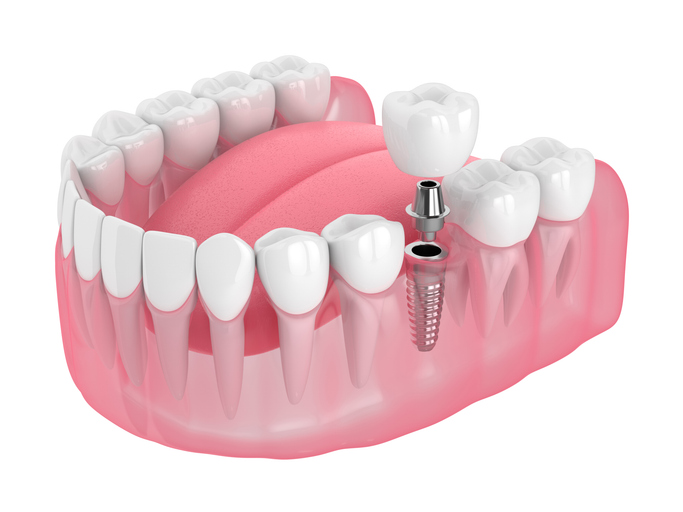If you’re considering dental implants to replace missing teeth, safety is probably one of your top concerns. And you’re not alone—many people wonder if dental implants are safe before deciding to go ahead with treatment. The good news? Dental implants are one of the safest and most successful procedures in modern dentistry. Let’s break down exactly why.
What Are Dental Implants?

Before we get into safety, let’s quickly cover what dental implants are. A dental implant is a small titanium post that’s surgically placed into your jawbone where a tooth is missing. Over time, the implant fuses with your bone in a process called osseointegration, creating a stable foundation for a crown, bridge, or denture.
1. Extensive Research and Decades of Use
Dental implants have been used for over 50 years and are supported by decades of scientific research. They’ve evolved significantly with advancements in technology, materials, and techniques. According to the American Academy of Implant Dentistry (AAID), over 3 million people in the U.S. have dental implants, and that number grows by approximately 500,000 each year.
2. High Success Rates
One of the biggest indicators of safety is success rate. Dental implants boast a success rate of 95% or higher, especially when placed by an experienced dental specialist like Dr. Trujillo. This makes them one of the most reliable tooth replacement options available today.
One of the biggest indicators of safety is success rate. Dental implants boast a success rate of 95% or higher, especially when placed by an experienced specialist.
While many general dentists offer implant services, choosing a periodontist like Dr. Trujillo can make a significant difference in both safety and outcome. Periodontists are dental specialists who undergo an additional 3 years of training beyond dental school, focusing exclusively on the structures that support the teeth—including the gums and jawbone. This advanced training gives them a deeper understanding of the biological and anatomical complexities involved in implant placement.
Periodontists also have extensive experience in managing more challenging cases, such as patients with bone loss, gum disease, or systemic health conditions that may affect healing. They are experts in techniques like bone grafting and sinus lifts, which may be necessary to ensure the implant has a strong, stable foundation.
So, while general dentists may be qualified to place implants, periodontists offer a higher level of expertise and precision, which can translate to fewer complications, faster recovery, and long-term success.
3. Biocompatible Materials
Dental implants are typically made of medical-grade titanium, a material known for its strength, durability, and ability to integrate with the human body. Titanium is used in many other medical implants as well, such as joint replacements, due to its proven safety record.
4. They Help Preserve Oral Health
Unlike bridges, which may require reshaping healthy adjacent teeth, implants preserve your natural teeth. They also prevent jawbone deterioration—a common problem after tooth loss. Maintaining bone health supports the stability of nearby teeth and helps preserve your facial structure.
5. Minimally Invasive With Modern Technology
Thanks to advanced imaging like 3D scans and digital planning tools, implant placement is more precise and less invasive than ever before. These tools help reduce complications, improve outcomes, and shorten recovery time.
6. Customized to Fit Your Needs
Implants aren’t one-size-fits-all. Each one is customized to fit your anatomy and bite, improving comfort and function. Because they feel and function like natural teeth, patients often forget they even have them.
7. Ongoing Monitoring and Maintenance
Dental implants are designed to last for decades or longer with proper care. Your dentist will guide you through home hygiene practices and provide routine checkups to monitor the implant. This proactive care is key to long-term success.
Here’s a new section you can add to your blog post to address patient candidacy and limitations:
When Dental Implants May Not Be the Right Option
While dental implants are safe and highly effective for most people, they’re not ideal for everyone. Certain medical conditions, lifestyle factors, or oral health issues may make implants a less suitable option, or may require additional treatment before proceeding.
Common Factors That May Limit Candidacy:
- Insufficient Bone Density: If your jawbone has deteriorated due to long-term tooth loss or gum disease, there may not be enough support for an implant without a bone graft.
- Uncontrolled Chronic Conditions: Health issues like uncontrolled diabetes, autoimmune disorders, or blood clotting problems can interfere with healing and increase the risk of implant failure.
- Smoking or Tobacco Use: Smoking significantly reduces blood flow to the gums, which can delay healing and increase the chance of implant complications.
- Certain Medications: Drugs that suppress the immune system, affect bone metabolism (like bisphosphonates), or increase bleeding risk can affect recovery and implant integration.
- Poor Oral Hygiene: Dental implants require a commitment to daily oral care. Patients with untreated gum disease or poor hygiene habits may not be good candidates until these issues are resolved.
What If You’re Not a Candidate Right Now?
The good news is that not being an immediate candidate doesn’t always mean implants are off the table permanently. Treatments like bone grafting, periodontal therapy, or lifestyle changes (such as quitting smoking) can improve your eligibility over time. A thorough evaluation by a periodontist like Dr. Trujillo will help determine the safest and most effective path forward.
Are There Risks?
As with any surgical procedure, there are risks—such as infection, nerve damage, or implant failure—but they’re rare and highly manageable. Most issues can be prevented by choosing a skilled provider and following post-operative instructions closely.
Final Verdict: Yes, Dental Implants Are Safe
If you’re healthy enough for a tooth extraction, chances are you’re a great candidate for a dental implant. However, successful implant placement does require a few essential health factors. You need to be in generally good health, free from uncontrolled chronic conditions like diabetes or immune disorders that could interfere with healing. It’s also important to have enough bone mass in your jaw to securely anchor the implant. If bone loss has occurred, bone grafting may be needed to rebuild a strong foundation.
In addition, certain medications, especially bisphosphonates (used for osteoporosis) or immunosuppressive drugs, can slow or complicate the healing process. Your dental provider will carefully review your medical history and medications to ensure your body is ready to support a dental implant.
The combination of biocompatible materials, cutting-edge technology, and professional expertise makes dental implants a safe, effective, and long-lasting solution for replacing missing teeth—when placed in the right patient under the right conditions.
Want to Know if You’re a Good Candidate?
A dental implant consultation, like Dr. Trujillo, is the best way to find out if this treatment is right for you. Dr. Trujillo will evaluate your oral health, bone density, and overall medical history to tailor a plan that suits your needs.

Dental implants aren’t just safe—they’re a game changer for your smile and your quality of life.








